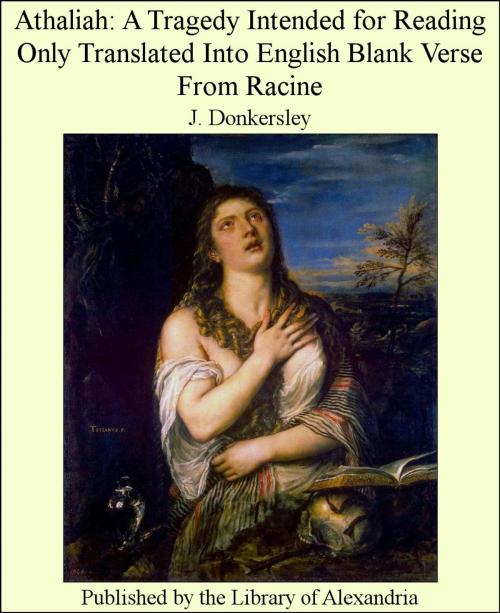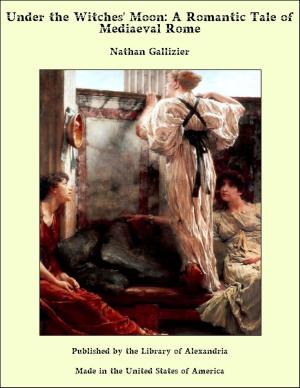Athaliah: A Tragedy Intended for Reading Only Translated Into English Blank Verse From Racine
Nonfiction, Religion & Spirituality, New Age, History, Fiction & Literature| Author: | J. Donkersley | ISBN: | 9781465526021 |
| Publisher: | Library of Alexandria | Publication: | March 8, 2015 |
| Imprint: | Language: | English |
| Author: | J. Donkersley |
| ISBN: | 9781465526021 |
| Publisher: | Library of Alexandria |
| Publication: | March 8, 2015 |
| Imprint: | |
| Language: | English |
Racine, the author of Athalie (Athaliah), flourished in the latter half of the 17th century. At his appearance, Corneille, the great French Dramatist, was in the full splendour of his fame, whose rival he was afterwards recognised to be. Athalie is a Tragedy in rhyme, consisting of six Iambic feet, similar to the Alexandrine verse found occasionally in our English poets at the termination of a sentence or paragraph. Dryden, and a few Others of less note, in the reign of Charles IL, introduced the rhyming drama to the English public; but the clank of its fetters was unpleasant to the British ear, which had become attuned to the freedom and majesty of blank verse. Blank verse, therefore, being our recognised vehicle of dramatic productions, has been employed in this translation. I did, however, intend in the first place to render the chorus into rhyme; but after maturer consideration it appeared to me that irregular blank verse would be more capable of tragic expression; and that it would also be more in harmony with the Hebrew rhythm as represented by the scriptures, from which the plot was appropriated. In carrying out my conception of what the translation ought to be, I have endeavoured to preserve the dignity of the subject, without sacrificing the freedom of dramatic force. It has, therefore, not been my aim to produce smooth monotonous numbers, but to harmonize the whole versification with the spirit and conditions of the theme. I have retained several of the French names, on account of their measure and euphony. Joas and Joad I have, I believe, invariably versified as one syllable, and Baal also, with one exception, which occurs in the first page; these words, to my judgment, being scarcely of greater quantity than thought, wrought, brought, &c. Should the reader realize the same amount of interest in the perusal of this translation that I have had in its production, I shall be amply rewarded for the genial labour bestowed upon it
Racine, the author of Athalie (Athaliah), flourished in the latter half of the 17th century. At his appearance, Corneille, the great French Dramatist, was in the full splendour of his fame, whose rival he was afterwards recognised to be. Athalie is a Tragedy in rhyme, consisting of six Iambic feet, similar to the Alexandrine verse found occasionally in our English poets at the termination of a sentence or paragraph. Dryden, and a few Others of less note, in the reign of Charles IL, introduced the rhyming drama to the English public; but the clank of its fetters was unpleasant to the British ear, which had become attuned to the freedom and majesty of blank verse. Blank verse, therefore, being our recognised vehicle of dramatic productions, has been employed in this translation. I did, however, intend in the first place to render the chorus into rhyme; but after maturer consideration it appeared to me that irregular blank verse would be more capable of tragic expression; and that it would also be more in harmony with the Hebrew rhythm as represented by the scriptures, from which the plot was appropriated. In carrying out my conception of what the translation ought to be, I have endeavoured to preserve the dignity of the subject, without sacrificing the freedom of dramatic force. It has, therefore, not been my aim to produce smooth monotonous numbers, but to harmonize the whole versification with the spirit and conditions of the theme. I have retained several of the French names, on account of their measure and euphony. Joas and Joad I have, I believe, invariably versified as one syllable, and Baal also, with one exception, which occurs in the first page; these words, to my judgment, being scarcely of greater quantity than thought, wrought, brought, &c. Should the reader realize the same amount of interest in the perusal of this translation that I have had in its production, I shall be amply rewarded for the genial labour bestowed upon it















